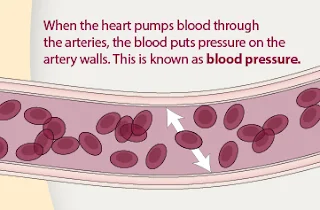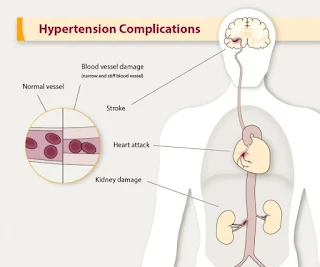Introduction - Causes of High Blood Pressure: The Problem and What You Should Know
What is Blood pressure?
Blood pressure is a blood pressure that presses against the walls of your blood vessels. Blood vessels carry blood from your heart to other parts of your body.
Your blood pressure often rises and falls throughout the day.
What do blood pressure numbers mean?
Blood pressure is measured using two numbers:
The first number, called systolic blood pressure, measures the pressure in your arteries when your heart beats.
The second number, called diastolic blood pressure, measures the pressure in your arteries when your heart is asleep in the middle of a heartbeat.
If the ratio reads 120 systolic and 80 diastolic, you can say, “120 over 80,” or write, “120/80 mmHg.”
Normal level of blood pressure
Normal blood pressure is below 120/80 mmHg¹.
No matter how old you are, you can take steps each day to keep your blood pressure in check.
What is high blood pressure (hypertension)?
High blood pressure, also called hypertension, is higher than normal. Your blood pressure changes throughout the day depending on your activities. Having blood pressure measures more consistently than usual can lead to the development of high blood pressure (or high blood pressure).
When your blood pressure levels are high, you run the risk of other health problems, such as heart disease, stroke and stroke.
Your healthcare team can diagnose high blood pressure and make treatment decisions by reviewing your systolic and diastolic levels in your blood and comparing them to the levels found in specific guidelines.
The guidelines used to diagnose high blood pressure may vary from healthcare technology to healthcare professionals:
- Some health care professionals find patients with high blood pressure if their blood pressure does not fluctuate 140/90 mm Hg or more.² This limitation is based on guidelines issued in 2003, as shown in the table below.
- Some health care professionals find patients with high blood pressure if their blood pressure remains 130/80 mm Hg or higher.¹ This limitation is based on guidelines issued in 2017, as shown in the table below.
What are the signs and symptoms of high blood pressure?
High blood pressure often has no warning signs or symptoms, and most people are unaware that they do. Measuring your blood pressure is the only way to know if you have high blood pressure.
What causes high blood pressure?
High blood pressure often develops over time. This may be due to unhealthy choices in lifestyle, such as not getting enough exercise. Certain health conditions, such as diabetes and obesity, may increase the risk of developing high blood pressure. High blood pressure can also occur during pregnancy.
What are the problems caused by high blood pressure?
High blood pressure can damage your health in many ways. It can severely damage vital organs such as your heart, brain, kidneys, and eyes.
The good news is that, in many cases, you can control your blood pressure to reduce the risk of serious health problems.
Heart Attack and Heart Disease
High blood pressure can damage your blood vessels by making them less stretched, reducing blood flow and oxygen to your heart and leading to heart disease. In addition, bleeding to the heart can cause:
Stroke and Mental Disorders
High blood pressure can cause blood vessels and oxygen to the brain to rupture or block, causing a stroke. Brain cells die during stroke because they do not get enough oxygen. Stroke can cause serious impairment of speech, mobility, and other basic functions. A stroke can also kill you.
High blood pressure, especially during childbirth, is linked to poor cognitive functioning and later dementia in life. Learn more about the link between high blood pressure and dementia from the National Institutes of Health's Mind Your Risks external icon.
Kidney Disease
Adults with diabetes, high blood pressure, or both are at greater risk of developing chronic kidney disease than those without these conditions.
How do I know if I have high blood pressure?
There is only one way to determine if you have high blood pressure: Have a doctor or other health professional measure it. Measuring your blood pressure is fast and painless.
Talk to your health care team about regularly measuring your blood pressure at home, also called blood pressure monitoring (SMBP).
High blood pressure is called a “silent killer” because it usually has no warning signs or symptoms, and most people do not know they have it.
What can I do to prevent or control high blood pressure?
Many people with high blood pressure can lower their blood pressure to a healthy range or keep their numbers in a healthy range by making lifestyle changes. Talk to your health care team about
- Get at least 150 minutes of exercise each week (about 30 minutes a day, five days a week)
- Non-smoking
- Eat a healthy diet, including a limit of sodium (salt) and alcohol
- Maintaining a healthy weight
- Stress management
Learn more about ways to manage and prevent high blood pressure.
In addition to making positive lifestyle changes, some people with high blood pressure need to take medication to treat their blood pressure. Learn more about high blood pressure medications.
Talk to your health care team immediately if you think you have high blood pressure or if you have been told you have high blood pressure but are not under control.
By taking steps to lower blood pressure, you can help protect yourself from heart disease and stroke, also sometimes called heart disease (CVD).
Diagnosing High Blood Pressure - Diagnostic Tests and Procedures
Diagnosis
Your doctor will ask you questions about your medical history and physical examination. A doctor, nurse, or other medical assistant will place a spinal cord in your arm and measure your blood pressure using a pressure gauge.
Your blood pressure should usually be measured on both arms to see if there is a difference. It is important to use the right handcuff.
Tests
If you have high blood pressure, your doctor may recommend tests to confirm the diagnosis and check for underlying conditions that can cause high blood pressure.
- Advanced monitoring. This 24-hour blood pressure test is used to make sure you have high blood pressure. The machine used for these tests measures your blood pressure every 24 hours and provides a more accurate picture of blood pressure changes above day and night. However, these devices are not available at all medical facilities, and may be free of charge.
- Laboratory testing. Your doctor may recommend urinalysis and blood tests, including cholesterol tests.
- Electrocardiogram (ECG or EKG). This quick and painless test measures your electrical activity of your heart.
- Echocardiogram. Depending on your signs and symptoms and the results of the test, your doctor may prescribe an echocardiogram to diagnose other symptoms of heart disease. An echocardiogram uses sound waves to produce images of the heart.
Treatment Options for High Blood Pressure - Lifestyle Changes, Medication, or Surgery?
A critical step in preventing and treating high blood pressure is a healthy lifestyle. You can lower your blood pressure with the following lifestyle changes:
- Weight loss if you are overweight or obese
- Quitting smoking
- Eat healthy foods, including DASH foods (eating plenty of fruits, vegetables, and dairy products that are low in fat, low in saturated fat)
- Reduce the amount of sodium in your diet to less than 1,500 milligrams a day if you have high blood pressure; Healthy adults should try to reduce their sodium intake to no more than 2,300 milligrams a day (about 1 teaspoon of salt).
- Regular exercise (such as brisk walking for at least 30 minutes a day, a few days a week)
- Limits alcohol to two drinks a day for men, one drink a day for women
In addition to lowering blood pressure, these measures improve the effectiveness of high blood pressure medications.






Comments
Post a Comment
Thanks to Come on Comment section